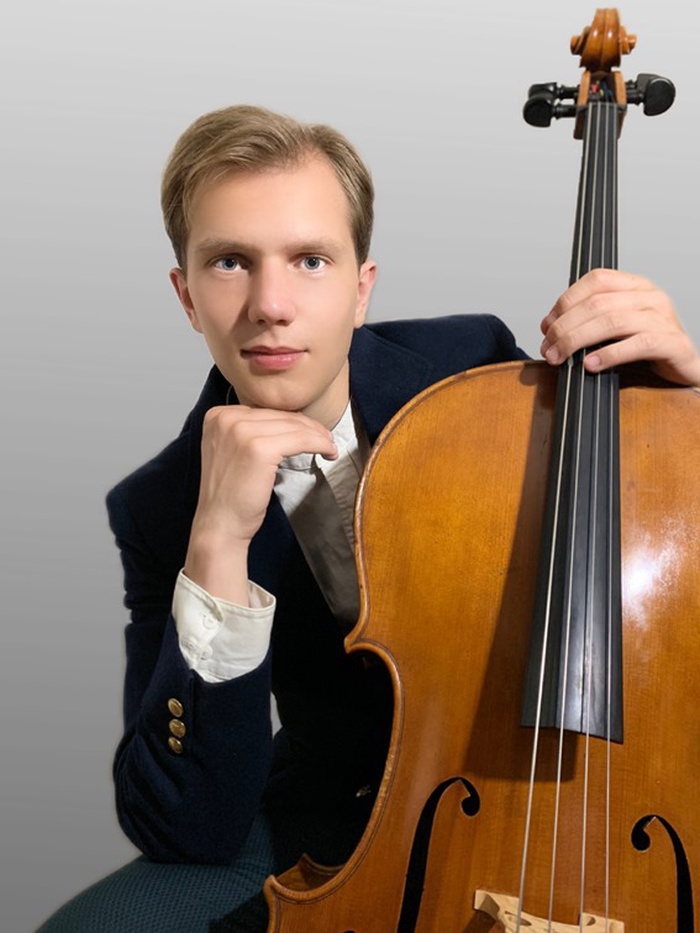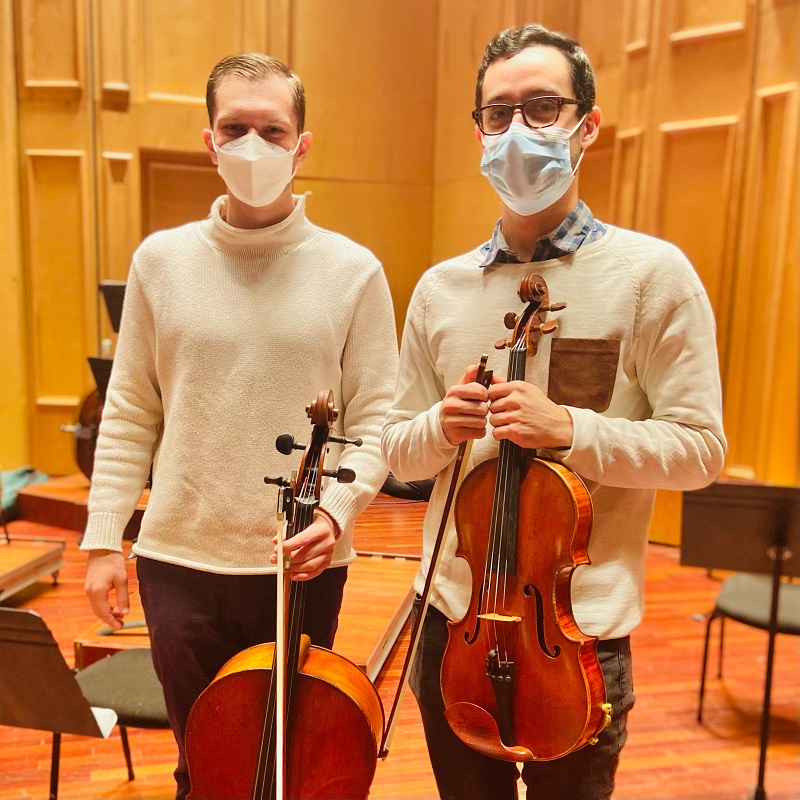Excerpts from an interview with new SDSO members Abraham Martín and Nathan Walhout
By Sam Hager and Andy Watkins
The process of getting a position with a symphony orchestra has got to be one of the weirder ones in the job market. You show up to an audition in a strange town with eighty or so colleagues from around the world. You play a bunch of orchestral excerpts to a faceless committee of musicians who sit behind a screen judging you. If you somehow make it to the final round and win the audition, then you have to transition from being a student and/or freelancer to a full-time symphony musician.
Moving to a new town and starting a new job can be stressful. In an orchestra you have to figure out how to deal with HR, union, music director, principal musicians, tenure process, and many other elements of a full-time gig that many players are unfamiliar with. This can be a strange and challenging time in any musician’s life. Throw a global pandemic in the mix and things get really interesting. We sat down with two of our newest members, Abraham Martín and Nathan Walhout to hear what their experience has been like starting their new jobs with the San Diego Symphony.
The following are excerpts from an interview on March 7, 2021.
Sam Hager: …you guys are starting in the middle of a pandemic. And we’ve seen your faces, probably a dozen times or more on zoom, but we’ve never really met you. That’s pretty weird. What is it like for you guys?
Nathan Walhout: It was certainly weird to get to know everyone, and somehow it felt like I was a co-worker already with these people before ever playing with you at all. Even seeing into people’s homes is kind of [a] weird thing that I never would have imagined happening. But it was nice to go to a first rehearsal and already know everyone’s names and faces. Being the new person, everyone also kind of knows who you are already, so it’s like we’d already been acquainted for a little bit.
Abraham Martín: I think because of how long it had been, I was just very grateful to be here and make music with people. I think it’s also an easier transition to start with strings only, which felt less overwhelming. So I don’t know, it felt nice to be in a smaller group. This way, we could get to know individuals better even with social distancing and masks.
Andy Watkins: I was just thinking back to when this all first kind of went down and we were having these orchestra meetings over Zoom. Everybody’s trying to figure out Zoom and that was right after you guys won your auditions, right?
NW: [I] won in February [2020] and still had a semester of school, so immediately we were trying to figure out which weeks I could come and sub before the end of the season. Then slowly, everything was getting canceled, although I still had high hopes. I thought, “I’ll move in June and we’ll have two months of pandemic and I’ll still move out in June and start the summer season because it’s outdoors. And it’ll be okay.” Then just slowly, more and more was taken away… even in August, we thought we were going to be playing in September. Over time, my stress levels of beginning the job slowly became lower and lower as the fall started and I ended up going back to school.
AM: For me, the viola audition happened back in November 2019. I obviously couldn’t believe it. This was my first audition, so everything was very new to me and I almost didn’t even recall my number for the last round. I did remember it, but I was in shock. I think it was a little more complicated for me, because I am not a US citizen. I came to this country as a student, and was on a student visa. To actually start working with the orchestra, I had to apply for an artist visa. This process already took a lot of time and dedication, and “proving your worth” to people who don’t really understand this specific job process was very exhausting. I received approval for the visa over the summer, and I think that’s when we were still talking about what the season schedule would look like, along with our contracts. I remember feeling unsure of whether or not this was going work out for me, specifically because of my immigration status, and how everything stopped.
NW: I felt very lucky. I was talking with Yao during the last work cycle, who said the cello audition was supposed to be in May and that he was trying to get it off of some holiday weekend. Then they pushed it to February. Dallas Symphony had an opening about two weeks after San Diego, but this was the last hired position of 2020 [for] cellos at least.
SH: Yeah, I remember that. Originally the bass audition was going to be in that slot. And of course, the bass audition didn’t happen.
AW: …didn’t we have several auditions lined up at that time of year that had to get canceled?
SH: Yeah, violin was cancelled, which there were four openings.
AM: I keep thinking about the timing. It was just perfect, especially for Nathan, because I had taken my audition the year before everything went out. This was my first orchestra audition; I was starting my master’s at Rice and figured, okay this is good. I should definitely start taking auditions. I was talking to colleagues of mine at Rice and they also looked at the audition, because San Diego had four openings. It’s very uncommon to have a lot of open positions. And so they were talking about it, and I expressed that I had always been very afraid of the idea of taking an audition. I didn’t want to deal with it at first, but then felt that I should grow up and face my fears. This was the time to take auditions, so I signed up and really prepared for it. And I’m glad I took that decision.
NW: Definitely. All of undergrad it just seemed increasingly hopeless as I got closer to graduating, and I would meet more and more people who were even already in their 30s still taking every audition year after year. I’d taken Houston Symphony just because my teacher was there. It was a really quick preparation, and I just wanted to get the first one over with. I was disappointed with my own preparation, but set an ultimatum for myself that I would quit cello if I didn’t have a job before I’m 28. I beat 28 by a little bit. I had gently been released out of the nest by my family and kind of had an extra fire crackling underneath me to practice a little extra.
AW: Yeah, that’s funny. I think everybody has that cutoff. Or at least kind of in the back of their mind, if not a hard cutoff. Mine was 30 and I got my job here when I was 28 after many, many auditions. I’m kind of jealous of guys like you. You said you only took a couple and then Abraham said that was your first one. That’s amazing. And another coincidence is that you guys were both at Rice [University] at the time. Is that right? And were you roommates there too?
AM: Yeah, that was super crazy and I just couldn’t believe it. Nathan and I were roommates during our first year at Rice. He mentioned to me, “I think I’m planning on taking the cello audition. It’s in February.” I thought, oh cool, good luck. I remember he asked if he could play some of the excerpts for me before traveling the week of his audition, to which I said “oh yeah, sure.” I listened to him play and thought, “oh, you sound great.” His audition happened soon after, which I didn’t really think about, but then one of our other roommates came up the stairs and said, “Nathan won the audition.” I was like, “No, you’re lying. This is not possible, two people in the same house.” That was crazy, and now we’re roommates again.
I do feel so lucky. I think when you win an audition, a lot of people think of you as being ‘great’ or that [you] have it in the bag. But when you’re in the situation and moment that it happens, you just feel as though it was a random thing. I felt confident with my playing, but you never know what they’re looking for. I think luck is definitely a part of the whole equation. Sometimes when it’s perceived from the exterior, people don’t see it, but luck is important.
AW: How do you feel about the process of fitting in musically with a new orchestra under the current circumstances?
AM: I just think it’s different this year. I mean, again, this is my first time, but I think in a way, it’s easier to transition because the way we’re working now is new for everyone. A lot of people are adjusting to something new, so coming in, it doesn’t feel like I’m alone in trying to fit into something that everyone else is already comfortable with. Of course, the orchestra already knows how to roll, but there are so many little changes with the setup and the way we’re working that I think everyone is trying to just adapt. So it’s kind of nice to just be part of this readjustment and feel like other people are doing that too.
SH: So what are you guys looking forward to? Artistically or musically, what kind of is exciting for you guys? And maybe what would you have been looking forward to that is not really possible now?
NW: I’ve always been enamored with orchestral repertoire, ever since playing big works at summer festivals, or even in high school playing just random symphonies. [I’m] kind of excited to churn through all of it. Even during these times, things here have already been at a much higher level of artistry and preparation. I’ve always liked performing and even the process leading up to it. It’s nice to be able to continue that, and hopefully within a year or so we can get back to playing weekly concerts.
AM: I think one of the biggest differences I noticed coming into the job is how different a professional orchestra feels in comparison to a student orchestra. I am very excited to be a part of this big San Diego Symphony family. I don’t think you get this kind of feeling when you’re playing with a school group, like the symphony at Rice, because people quickly come and go. It might be similar here, since some people do pass through, but I feel like there are definitely certain traditions in place. It’s very exciting to meet and to be a part of something bigger than just the piece or the composer, and to be a part of the family and the structure of this small bubble of people. I’m very excited for that.
NW: [I was listening to the symphony stream of] Prokofiev 7. I was getting super nervous just because it sounded so good, and just kept on getting better. I’ve wanted to play late Prokofiev works, and I’ve yet to play Beethoven Two and Nine.
AM: I’ve always been very connected to Beethoven’s sixth, the Pastoral Symphony, but have actually never had the chance to play it. I was so excited last year for the anniversary of Beethoven’s birthday. It was exciting to start my new position with the orchestra and play a bunch of Beethoven. Obviously, that didn’t quite work out logistically, but hopefully that’s a piece I’ll play in the future. Another piece I’ve never played before that I find really cool is Mahler Two. Of course, that piece requires so many people on stage so I’m assuming it will take a period of time before we can manage to pull that off safely, but who knows.
AW: Tell us about moving to San Diego. What’s that been like, under these circumstances that we’re in? Was apartment hunting weird, or what are some other things that might have been unique?
NW: We were instructed to get here 14 days before the first service on the 24th of January. Around December 20th we were both just thinking “we have no idea where to live.” We’d both been browsing the apartment listings throughout the fall. [We’d see something that was really nice] and then it would be gone within the morning. We tried virtual tours, which was convenient in that most places didn’t actually have in-person tours because of COVID. I’ve never signed an apartment lease without being in the city before.
AM: It was nice to move in together and start this whole journey with someone familiar. We went to IKEA and got our furniture together, which was a nice way to start a new chapter of your life especially now when it’s easy to feel so isolated. Because of COVID, you don’t have many opportunities for social interactions and I think we made a good decision to be roommates, which was not my plan in the beginning. I thought that upon winning this job, I’m going to live by myself for the first time. But I think it ended up working out.
NW: Just in terms of seeing a new city though, it’s not ideal. I’ve heard a lot of great things about San Diego beer, food and just nightlife for access to great seafood and more, but everything is largely closed. [I’m] trying to stick very close to the guidelines from the committee. Not doing anything is a little depressing, especially because it’s so nice to be outside. I just want to go out all the time. San Diego will get better and better for us as we live here.
AW: I can’t imagine that’s got to be really tough. It’s so exciting to move to a new city and then you just can’t do really anything so that’s a bummer. Sorry you guys have to put up with that. But I appreciate you following the code of conduct. That’s great. Thank you for doing that. Any other insights about the time we’re in or the process of starting a new job?
AM: Something I’ve noticed after starting with a professional orchestra, and even before from just watching performances or hearing descriptions from others is that professional orchestras tend to play behind the beat of the conductor, and [younger] orchestras play directly with the conductor or even ahead of when they beat. I didn’t notice this in the beginning; when I started playing with the symphony, the general reaction was just slightly delayed, but everyone’s together. Everyone knows how it works and you don’t want to be the new person that’s kind of messing [up and] coming in when no one else is playing. This was a little shocking in the beginning, and I was thinking “oh my god, what, where is it? Where do I place my beat?” I think I’ve started to get used to it. You wouldn’t really think about that when you’re just thinking about starting a job, but that was something I noticed in this position.
AW: Yeah, it’s an interesting time since we’ve got a relatively new conductor. I think we’re kind of in a transition period as to how we play, because the conductor definitely influences us. Jahja Ling was here for a long time and he had a big effect on how the group interprets what a conductor does. So it’ll be interesting to see where Payare takes us.
NW: So just hearing from random musicians in other professional orchestras about their workplace environment and dynamic, I’ve always wondered on the spectrum from friends to strict co-workers, how “together” is San Diego Symphony community? I’m just wondering, as I’ve heard about varying experiences from musicians in [other orchestras where things maybe aren’t so friendly].
SH: I think we don’t have that much of that. We’re pretty friendly in general. And there’s a lot of hanging out outside of work, you know, in normal times.
AW: There’s always people who will butt heads every once in a while, but a large portion of the orchestra likes to hang out outside of work, especially after concerts. A lot of people will go out and have drinks together. It’s a good group of people and I think you guys will have fun once we get back to some sense of normalcy. First chance we get we’ll take you guys up to Miramar. Sam and I used to go up there every once in a while and go to all the beer tasting rooms.
SH: Yeah, that’d be fun. I think that’s a good place to wrap the interview up. Thanks, guys. Thank you to Abraham and Nathan for telling us about their experiences as brand new SDSO members! Check out their bios here:



